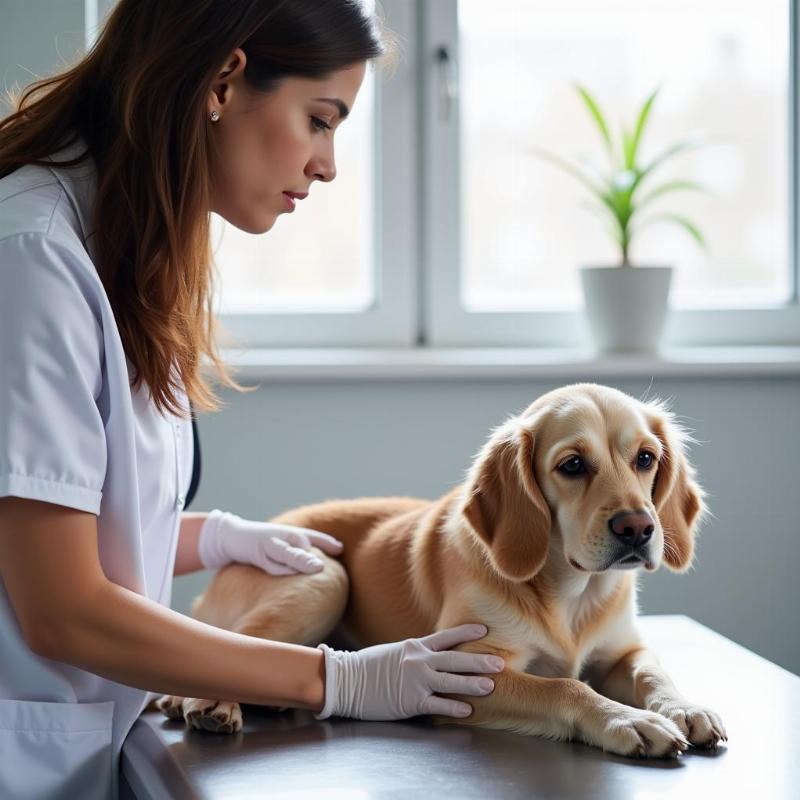If your dog can’t get up, it’s a serious situation that requires immediate attention. This inability to stand could indicate a range of problems, from minor muscle strains to severe medical conditions. Understanding the potential causes, recognizing the symptoms, and knowing how to respond is crucial for your dog’s wellbeing. This guide will provide you with the necessary information to navigate this challenging situation and ensure your furry friend receives the proper care.
Why Can’t My Dog Get Up?
Several factors can contribute to a dog’s inability to stand. Age is a significant factor, as older dogs are more prone to arthritis and other joint issues that can hinder mobility. Certain breeds, like German Shepherds and Dachshunds, are predisposed to specific conditions such as hip dysplasia and intervertebral disc disease, respectively, which can also lead to difficulty standing. Trauma, such as a fall or being hit by a car, can cause injuries that prevent a dog from getting up. Additionally, various illnesses, including infections, neurological disorders, and even tick-borne diseases, can significantly impact a dog’s mobility.
Recognizing the Symptoms
While the primary symptom is the inability to stand, several other signs can accompany this and help determine the underlying cause. These include whining or yelping in pain, trembling or shaking, reluctance to move, swelling in the limbs or joints, labored breathing, and changes in appetite or behavior. If you observe any of these symptoms in conjunction with your dog’s inability to get up, it’s crucial to seek veterinary care immediately.
What to Do if Your Dog Can’t Get Up
If your dog is unable to stand, the first step is to assess the situation calmly. Try to determine if there is any obvious injury, such as a broken bone or bleeding. Avoid moving your dog unnecessarily, as this could worsen any potential injuries. If possible, carefully transport your dog to the nearest veterinarian. Use a blanket or board to support its body and minimize movement. If you suspect a spinal injury, it’s essential to keep the spine as stable as possible during transport. Time is of the essence in these situations, so contacting your veterinarian or an emergency animal hospital immediately is critical.
Seeking Veterinary Care
At the veterinary clinic, the veterinarian will conduct a thorough examination, including checking for pain, swelling, and neurological deficits. They may recommend diagnostic tests like X-rays, blood work, or MRI to pinpoint the cause of the problem. Treatment will depend on the underlying condition and could range from pain medication and physical therapy to surgery in more severe cases.
 Veterinarian examining a dog that can't stand
Veterinarian examining a dog that can't stand
Preventing Mobility Issues
While not all mobility problems are preventable, some measures can help reduce the risk. Maintaining a healthy weight through a balanced diet and regular exercise can significantly reduce stress on joints. Providing joint supplements, particularly for older dogs or breeds prone to joint issues, can also be beneficial. Ensuring a safe environment, free from hazards that could cause falls or injuries, is crucial. Finally, regular veterinary checkups can help detect and address potential problems early on.
Conclusion
If your dog can’t get up, it’s a serious concern that requires prompt veterinary attention. Recognizing the symptoms and understanding the potential causes can help you make informed decisions and ensure your furry companion receives the necessary care. By taking proactive steps to prevent mobility issues and seeking veterinary care when needed, you can help your dog maintain a healthy and active lifestyle.
FAQ
- My dog suddenly can’t get up. What should I do? Contact your veterinarian or an emergency animal hospital immediately.
- Could my dog’s inability to stand be due to old age? Yes, age-related conditions like arthritis can contribute to mobility issues.
- What diagnostic tests might my vet recommend? X-rays, blood tests, and MRI are common diagnostic tools.
- Are there any preventative measures I can take? Maintain a healthy weight, provide joint supplements, and ensure a safe environment.
- What treatment options are available? Treatment varies depending on the cause and can range from medication to surgery.
- How can I make my dog comfortable during recovery? Provide a soft bed, easy access to food and water, and minimize movement.
- Can my dog fully recover from an inability to stand? The prognosis depends on the underlying cause and the severity of the condition.
Beautdogs.us is your premier destination for all things dog-related in the USA. We offer expert advice on dog breeds, care, and lifestyle. From puppyhood to senior years, Beautdogs.us is your trusted source for reliable information. Contact us at [email protected] or call us at +1 501-555-7529.